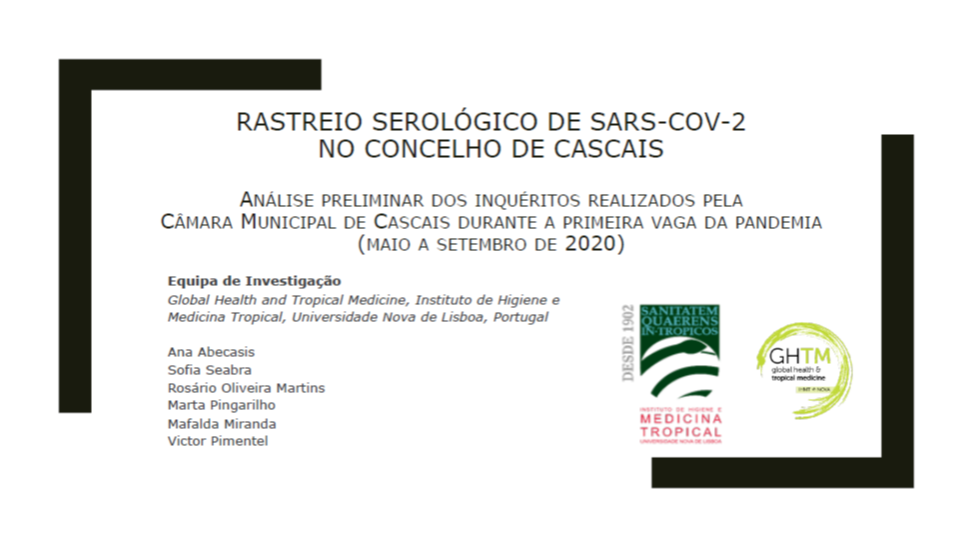Having as a mission «To foster research, training and implementation on Global Health and Tropical Medicine», GHTM R&D Centre’s researchers are very interested to better understand the percentage of SARS-CoV-2 infections in the Portuguese Speaking Communities, in Portugal or abroad.
In May 2020, the Cascais City Council established a partnership with GHTM to conduct a community-level seroprevalence survey, which included blood serology testing for SARS-CoV-2 antibodies together with socio-demographic and clinical questions.
The survey’s general goals were:
- to estimate Cascais municipality SARS-Cov-2’s seroprevalence;
- to identify associated socio-demographic and clinical factors .
This 1st phase of the study comprehended the pandemic period between May and September 2020, and had 12,032 respondents, corresponding to 5.62% of Cascais’ total population.
The lab assay used to detect SARS-Cov-2 IgG/IgM antibodies was the ROCHE SARS-CoV-2 Rapid Antibody Test.
The percentage of reactive tests was 1.3% (95% C.I.: 1.12 – 1.53) overall, 1.16 % among females and 1.56 % of males. The age group with the highest prevalence (2%) was 20-39 years old. Generally, there were not significant differences among educational levels or professional status. However, immigrant respondents had a significantly higher seroprevalence (2.99% vs 1.31%) p<0.05. Moreover, immigrants in the age group of 20-29 years old had significantly a higher seroprevalence when compared to the others (11.1%).
Furthermore, a significantly lower seroprevalence was found among patients reporting to have Diabetes (0,58%) and cardiovascular disease (0,76%), possibly reflecting higher levels of adherence to social distancing recommendations in these patients, for which a high risk for severe disease was reported since the beginning of the pandemic.
The sample comprised 1669 people who had done at least a PCR test, with 60 positives. Of these, unexpectedly, 32.8% did not test positive for IgG/IgM antibodies. Among the 5.3% of respondents who reported contact with a suspected or infected person, 9.65% were reactive.
Of the 44.3% of respondents that mentioned having had one symptom congruent with COVID-19, 2.02% were serum-positive. 1.8% of these never did a PCR test and were seropositive. On the other hand, of the 158 serologic reactive, 31.6% were asymptomatic. The most frequent symptom of the disease was fatigue, referred by 37.4% of the reactive, although loss of taste or smell are the most specific COVID-19 symptoms, as 98.6% and 98.3%, respectively, of seronegative people did not show them.
These results highlight the largest serological SARS-Cov-2 survey in Portugal. Questionnaires are still being analysed and further results, corresponding to the time period between October 2020 and January 2021 will be reported soon.
GHTM’S RESEARCHERS INVOLVED IN THE ABOVE STUDY
Ana Abecasis Sofia Seabra Rosário Martins
Marta Pingarilho Mafalda Miranda Victor Pimentel



[…] Read the news article. […]